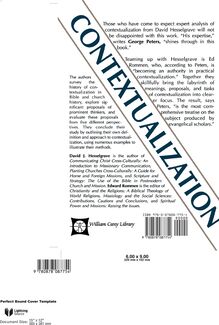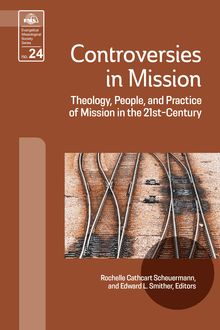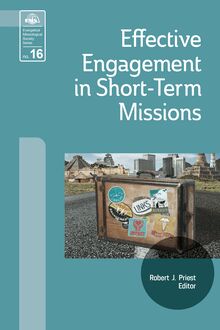-
 Univers
Univers
-
 Ebooks
Ebooks
-
 Livres audio
Livres audio
-
 Presse
Presse
-
 Podcasts
Podcasts
-
 BD
BD
-
 Documents
Documents
-
- Cours
- Révisions
- Ressources pédagogiques
- Sciences de l’éducation
- Manuels scolaires
- Langues
- Travaux de classe
- Annales de BEP
- Etudes supérieures
- Maternelle et primaire
- Fiches de lecture
- Orientation scolaire
- Méthodologie
- Corrigés de devoir
- Annales d’examens et concours
- Annales du bac
- Annales du brevet
- Rapports de stage
La lecture à portée de main
Vous pourrez modifier la taille du texte de cet ouvrage
Découvre YouScribe en t'inscrivant gratuitement
Je m'inscrisDécouvre YouScribe en t'inscrivant gratuitement
Je m'inscrisEn savoir plus
Vous pourrez modifier la taille du texte de cet ouvrage
En savoir plus

Description
Sujets
Informations
| Publié par | William Carey Publishing |
| Date de parution | 02 mai 1994 |
| Nombre de lectures | 0 |
| EAN13 | 9780878089796 |
| Langue | English |
Informations légales : prix de location à la page 0,0550€. Cette information est donnée uniquement à titre indicatif conformément à la législation en vigueur.
Extrait
Scripture and Strategy:
The Use of the Bible in Postmodern Church and Mission
David J. Hesselgrave
Copyright © 1994 by Evangelical Missiological Society All Rights Reserved.
No part of this publication may be reproduced, stored in a retrieval system, or transmitted in any form or by any means—electronic, mechanical, photocopy, recording or any other—except for brief quotations embodied in critical articles or printed reviews, without prior permission of the publisher.
Published by William Carey Library 1605 E. Elizabeth Street Pasadena, CA 91104 www.missionbooks.org
William Carey Library is a ministry of Frontier Ventures Pasadena, CA | www.frontierventures.org
Digital eBook release Primalogue 2016 ISBN: 978-0-87808-979-6
Library of Congress Cataloging-in-Publication Data Hesselgrave, David J. Scripture and strategy : the use of the Bible in postmodern church and mission / by David J. Hesselgrave. p. cm. Includes bibliographical references. ISBN 0-87808-375-8 (pbk). 1. Bible—Study and teaching. 2. Evangelistic work— Philosophy. 3. Missions—Theory. I. Title. BS600.2.H454 1994 94-36869 220’.09’04—dc20 CIP
To The Officers and Members of the Evangelical Missiological Society
Contents
Foreword to the Series
Foreword to Scripture and Strategy
Acknowledgments
Part I: Introduction
1. Back to the Future
Part II: The Place of the Bible in Christian Thought
2. Carl F. H. Henry: Recovering Biblical Authority
3. Erich Sauer: Rediscovering Biblical Theology
4. William J. Larkin, Jr.: Rethinking Biblical Interpretation
5. Paul G. Hiebert: Revisiting Contextualization
Part III: The Place of the Bible in Christian Ministry
6. Hans-Ruedi Weber: Confronting the World with the Gospel
7. Trevor McIlwain: Confirming Believers in the Christian Faith
8. Timothy M. Warner: Counseling Christians Concerning Spiritual Warfare
9. John Piper: Challenging the Church to Christian Mission
10. Ralph D. Winter: Consecrating and Training Future Leaders
Part IV: Conclusion
11. Forward to the Future
Bibliography
Foreword to the Evangelical Missiological Society Series
We are navigating a “sea change” in missions today. The old paradigms, which God used so greatly in the past two centuries despite their flaws, no longer serve missions well. New ones are beginning to emerge, but not all are faithful to biblical teaching and most are untested.
This sea change is due to many factors. One is the success of the modern mission movement that has left churches in most countries around the world. Today these churches are maturing in strength and leadership, and many are involved in mission. A second factor is the changing world scene. The currents of nationalism, cultural revivalism, resurgent ethnic loyalties, urbanization, world trade and global communication networks are pulling the world in different directions. The result is growing conflicts between traditional cultures and modernity, between rival ethnic groups, between rich and poor, and between nations vying for dominance. How do we carry out our mission mandate in such turmoil? How do we free ourselves from identification with Western cultures, and manifest in our ministry the global nature of the church and mission?
In 1993 the Evangelical Missiological Society began a concerted study of the mission scene to provide guidance for evangelicals involved in missions in these times of transition. It decided to focus its conferences each year on a common theme addressing one of the major challenges facing contemporary missions, highlighting especially the theological issues involved. These challenges offer us both opportunities for greater outreach and risks of undermining the mission cause. Select papers from these conferences and from members of the association are to be published each year in a volume that focuses our attention on a critical issue in contemporary missions and provides evangelical responses to these questions. The goal is to create both awareness and discussion among missionaries and mission scholars, and to present in-depth evangelical responses to the questions.
We are privileged to present Scripture and Strategy by David Hesselgrave as the first volume in the series. The author has played a key role in the development of the EMS and its wide-ranging ministries. In this book he examines the place of the Bible in formulating church and mission strategy for the postmodern age which we have now entered. In doing so, he lays a foundation for discussing the various issues that will be addressed in subsequent volumes.
The second volume, to be edited by Edward Rommen and Harold Netland and published in 1995, will address the questions of religious pluralism and the uniqueness of the Gospel. The plan is to issue at least one volume each year during the remaining years of this decade, D.V. We hope that the series will help pastors, evangelists, administrators, practitioners and mission scholars see a clear way through our confusing times so that they can serve with greater faithfulness and fruitfulness. Above all we pray that the series may bring glory to our Lord and Savior, Jesus Christ, the Head of the church and the beginning and end of all missions.
Paul G. Hiebert Chairman, Publications Committee Evangelical Missiological Society
Foreword to Scripture and Strategy
It must have been a sickening sight. A band of bold adventurers who had braved an unknown ocean stood on the shore of a Caribbean island and watched their ship, the Santa Maria , dashed to pieces on the rocks. How could anyone have let it happen? Did someone cut the anchor line? Was someone asleep on their watch? Accounts vary, but Columbus’ voyage of adventure, discovery, business and missions nearly went down with that ship.
In New Testament times there were concerns that believers might drift away from their moorings and shipwreck themselves and perhaps the church as well. The writer of Hebrews, referring to salvation by faith in Christ, made known through the sure Word of God, urged his readers to “pay more careful attention to what we have heard, so that we do not drift away” (Heb. 3:1). This is the basic concern of David Hesselgrave and of this series, expecially as it relates to the missionary movement.
The biblical and theological foundations for this magnificent enterprise we call “missions” has been well laid. Writers and practitioners like Bavinck, Allen, Nevius, Kraemer, Verkuyl, Peters and Beyerhaus labored effectively to base the modern mission movement on the Word of God. The United Bible Societies and Wyc1iffe Bible Translators have made the Bible more than the middle name of their respective organizations. They, along with others, have worked to make the Scripture available in every language of the world. But will the churches and missions keep the Bible foundational and central to their task as the Lord grants yet more time to carry forward the missionary mandate? The thesis of Scripture and Strategy is that they can and must.
Michael Pocock President, Evangelical Missiological Society
Acknowledgments
In writing this book I owe so much to so many colleagues, friends and family members that the following paragraphs could easily be extended beyond the patience required to read them. However, to overlook the contributions of at least some of these benefactors would be inexcusable. So, with a plea for understanding on the part of those whose names are omitted though deserving of inclusion as well as on the part of readers who will pause to read these lines, I will proceed.
First of all, I express my appreciation to faithful colleagues at home and abroad whose faithfulness to Christ, his Word and his cause have both inspired and informed this book. The list is long, but all whose works and writings are highlighted in the following chapters would certainly be included. In addition, Carl Henry, William Larkin, Paul Hiebert, Timothy Warner, John Piper and Ralph Winter made themselves available to review chapters focusing on their respective and related writings. In several sections of this book I have leaned rather heavily on certain writings of David Wells and Walter Kaiser. They reviewed this entire manuscript and made valuable suggestions. A number of others have kindly responded to my request for their insights and evaluations. My secretary in the School of World Mission and Evangelism at Trinity Evangelical Divinity School, Linda Walters, helped out at critical junctures. I am greatly indebted to them all.
Since this book is the first in a series being projected by the Evangelical Missiological Society, it is appropriate that I express gratitude to the entire membership both for the privilege of serving them as executive director and the opportunity to contribute this first volume in the series. I am especially grateful to the former EMS president, Paul Beals, the current president, Michael Pocock, the publications chairman, Paul Hiebert, and the members of the executive and publications committees for all they have done to make this publication possible.
As always, members of my immediate and extended families deserve mention. My wife Gertrude undertook duties that I should rightly share and thus made this writing possible. My son, Ronald Paul, proofread the manuscript. My son-in-law Martin Kroeker put it on Microsoft Word. And my nephew, Ric DuBois, designed the cover. Finally, I want to recognize the special contributions of David Shaver, Jone Bosch, Ralph Winter and all who are in any way connected with William Carey Library. For many years now all of us who are concerned with Great Commission mission have been the beneficiaries of their sacrificial service in publishing and distributing missionary literature. This book, being the first in the EMS series, has required special attention and effort. They are to be commended for the way in which they have responded. I offer them my special thanks.
Finally, I want to recognize the special contributions of Da
-
 Univers
Univers
-
 Ebooks
Ebooks
-
 Livres audio
Livres audio
-
 Presse
Presse
-
 Podcasts
Podcasts
-
 BD
BD
-
 Documents
Documents
-
Jeunesse
-
Littérature
-
Ressources professionnelles
-
Santé et bien-être
-
Savoirs
-
Education
-
Loisirs et hobbies
-
Art, musique et cinéma
-
Actualité et débat de société
-
Jeunesse
-
Littérature
-
Ressources professionnelles
-
Santé et bien-être
-
Savoirs
-
Education
-
Loisirs et hobbies
-
Art, musique et cinéma
-
Actualité et débat de société
-
Actualités
-
Lifestyle
-
Presse jeunesse
-
Presse professionnelle
-
Pratique
-
Presse sportive
-
Presse internationale
-
Culture & Médias
-
Action et Aventures
-
Science-fiction et Fantasy
-
Société
-
Jeunesse
-
Littérature
-
Ressources professionnelles
-
Santé et bien-être
-
Savoirs
-
Education
-
Loisirs et hobbies
-
Art, musique et cinéma
-
Actualité et débat de société
- Cours
- Révisions
- Ressources pédagogiques
- Sciences de l’éducation
- Manuels scolaires
- Langues
- Travaux de classe
- Annales de BEP
- Etudes supérieures
- Maternelle et primaire
- Fiches de lecture
- Orientation scolaire
- Méthodologie
- Corrigés de devoir
- Annales d’examens et concours
- Annales du bac
- Annales du brevet
- Rapports de stage




















